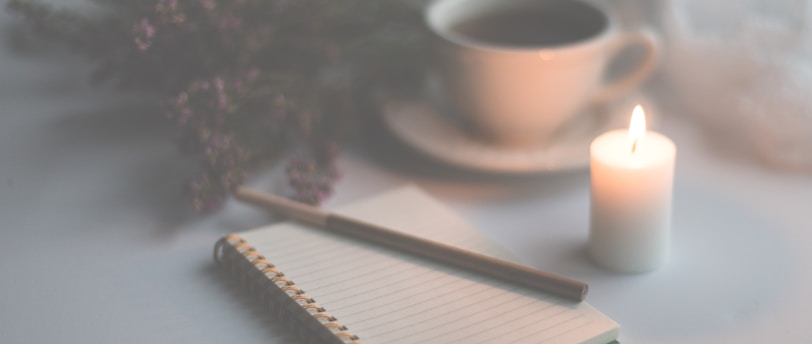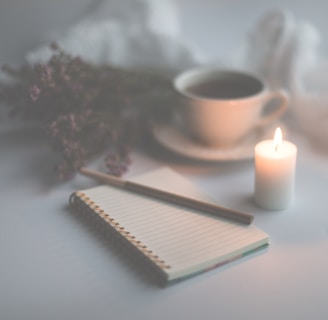Ink Therapy: How Journaling Acts as a Daily Reset for the Mind
OPINIONFEATUREDELAHE Z.
Elahe Z.
4/3/20256 min read


When Your Mind Won’t Slow Down
My mind won’t shut off. As I lay in bed, the stillness of my body so at odds with the commotion of my thoughts, I spend minutes trying to tap into that quiet, thoughtlessness needed for a good night’s rest. Those minutes turn into hours, and my original stillness is replaced by tossing and turning, ruffled sheets, and pillows being fluffed in an attempt to find a moment of relief. But it’s not my comfort that keeps me awake, it's the events of my day, constantly pestering me and jolting me awake every time I try to drift off. It’s the homework I didn’t have time to complete and that kept me awake this late anyway, and it’s my emotional exhaustion from that argument during lunch that has no outlet. I glance over to my alarm, marking the two hours until its incessant ringing forces me to start my day. Giving up on any chance at sleeping, my frustration has me reaching for the small notebook I keep on my nightstand, a pen already clipped onto the cover. Its blank, cream-colored pages show my lack of commitment to the hobby I picked up a couple weeks ago, and I decide to finally put pen to paper.
Journaling as Mental Maintenance
While this specific situation is a some-what fictional example, it is still a reality for people who understand the importance of putting your thoughts down on paper. In the same way that exercise keeps you fit and eating clean benefits you physically, journaling is that third step that works towards improving the other half of a well-balanced individual: their mental health. Because mental health isn’t visible from the outside, many people assume that that razor-sharp focus on their physical appearance is enough to keep them healthy, but that is far from the truth. The problem with struggling internally is that without addressing those concerns, you give them the opportunity to manifest in your everyday life. They in turn become more difficult to deal with, like the insomnia and anxiousness the character in the anecdote experiences. Prioritizing your mental health can immediately make you feel more productive, decisive, and cope with everyday stressors. Not only will you strengthen your ability to build relationships and handle challenges, but your physical health will also benefit from these changes. So how do you start prioritizing what's going on under the surface? Learning how to journal is a great first step.
From Childhood Diaries to an Aesthetic Coping Mechanism
As a teenager, what reintroduced me to journaling is how romanticized it is online. In almost every video I would see on social media, someone’s morning routine involved journaling before starting their day. The information on journaling itself stopped there, usually including a two second clip with little to no explanation. Originally, I had been exposed to writing in a diary as a seven or eight year old, getting drawn in by the bright colors and exciting fonts on journals at school book fairs. The difference between these two experiences is that instead of describing the practice as “writing in my diary” like I would have when I was younger, journaling was now considered “aesthetic” and “productive” as a teenager. This initial exposure to journaling through social media is what made the hobby seem easily attainable, and got me excited just thinking about incorporating it into my mornings. After that excitement wore off, my first challenge presented itself as the actual time of day I was choosing to write. Initially, I was having a hard time writing every single morning, and it started feeling more like a chore instead of an actual enjoyable and helpful hobby. I shifted my mindset to my needs, and instead of planning for it to be done every morning, I focused more on what I need and when I’m more comfortable to tap into whatever emotions are occupying my thoughts.
Finding a Journaling Routine That Works
In reality, I realized that journaling is not a one size fits all sort of practice. It’s something that you can adapt to fit your needs in that moment, and even how you’re expressing yourself can be adapted too. For example, depending on my reason for journaling, I shift between writing in a notebook and recounting my daily experiences, to needing an emotional dump in the Notes app of my cellphone. For the most part, my entries are a couple of pages long when I’m not under emotional stress. On special occasions, those paper entries shift to rants typed out frantically on my phone, and occasionally, the perfect way to describe how I feel is a short, little poem that gets the job done. Sometimes it’s a structured moment of my day, and other times I just need an outlet to get it all out and in front of me. Based on my personal experience, what makes journaling so powerful is the act of being able to see what I’m thinking on paper (or on my phone), in turn making me feel more in control of my emotions since I’m bringing them into existence. Through these practices, I realized that journaling doesn’t have to be done a certain way to be effective, but instead just prioritizing it and being consistent is what really makes a difference.
Different Views on Journaling - A Habit that Clicks or Doesn’t
Contrastingly, some peers I interviewed reported different perspectives. For example, Interviewee 1 is a high school student who has never journaled nor wanted to, but still respects people who incorporate this practice into their lives. He finds himself willing to try if given the opportunity, but honestly doesn’t want to “put in the effort in the first place” to start. This opinion differs from my own experience, and the experiences of the other peers I interviewed. Interviewee 2 is also a high school student, but the similarities end there. She uses journaling to learn more about herself, but more specifically, she enjoys writing down her dreams to later reflect and understand them. Her goal is to journal about twice a week, but similarly to what I do myself, she tries to write more when she needs to “let something loose”. When asked to give advice to someone new to journaling, her response was centered around the fact that “just starting” was the most helpful for her. She reflected on the fact that, “once you actually start writing down whatever you are thinking about at the moment, the rest of your entry will start to fill in and flow out of you.” If someone is still “clueless”, Interviewee 2 stated that following prompts helped her tremendously when starting her down the path of an avid journaler.
Finally, the last high school student is the most “committed” to this form of self-expression, and also uses methods different from the other two interviewees. Interestingly, Interviewee 3 not only journals on paper, but also on her phone, specifically her notes app. The difference comes not in the methods for journaling, which are the same I like to use, but in the uses for the methods themselves. Adversely, when Interviewee 3 wants to record an emotionally stressful moment, writing on paper is her preferred method for “letting it out” and writing in her notes app is reserved for short snippets and not emotionally draining entries. Her preferred method is writing in a journal, sometimes following a prompt and other times filling countless pages with just her thoughts. A different method she has occasionally tried is voice memos, meaning recording herself talking about whatever is occupying her thoughts. To sum it up, because she uses so many different journaling techniques, Interviewee 3 is able to adapt them to whatever she is feeling at the moment, making the hobby less stressful and easily incorporated into her life.
More Than Just Pen and Paper
If you want to start journaling yourself, exploring different ways that might resonate personally with you is a great first step:
Daily Reflection Journal – Writing about your daily experiences, emotions, and thoughts. This method helps process feelings, recognize patterns, and track personal growth.
Gratitude Journal – Listing things you are grateful for each day. It encourages positivity and mindfulness, reducing stress and increasing overall happiness.
Bullet Journal – A mix of a planner, to-do list, and diary using bullet points, symbols, and short notes. It’s great for organization, goal tracking, and productivity.
Poetry Journal – Writing and expressing thoughts through poetry instead of written, paragraph-form entries.
Prompt-Based Journal – Responding to thought-provoking prompts or questions, which can focus on self-discovery, emotions, or creativity.
Dream Journal – Recording dreams upon waking to analyze patterns, themes, and emotions. Useful for self-reflection and understanding the subconscious mind.
Art Journal – Combining drawings, paintings, or collages with words to express thoughts and emotions visually. Ideal for creative individuals who prefer non-verbal expression.
Travel Journal – Documenting experiences, places visited, and personal reflections during travels. Helps preserve memories and cultural insights.
Health & Wellness Journal – Tracking diet, exercise, sleep, and mental health habits. Useful for identifying progress and making lifestyle improvements.
Manifestation Journal – Writing down goals, affirmations, and visualizations to attract positive outcomes through intentional thinking.
Interested? Find more by Elahe here!
ABOUT ELAHE
Elahe Zandy is 16 years old and a 10th grade student at Centner Academy. Her interest in journalism comes from an overall love for writing and expressing her thoughts on paper, as well as just a passion for learning about what is going on in the world. Last year, she had her first experience in the competitive world of writing, since she participated in the Emmerse Essay Competition, resulting in winning a scholarship for a summer program. Being a part of the Centner Academy journalism program has been a great experience to understand all the different aspects of the profession and the importance of news. In addition to enjoying writing, Elahe spends her time playing on the Centner Academy Tennis Team and co-chairing the Field Trip Fundraising Club.
Engage
Empowering students to share their stories and news.
Connect
thepollinatorpost@gmail.com
© 2024. All rights reserved.